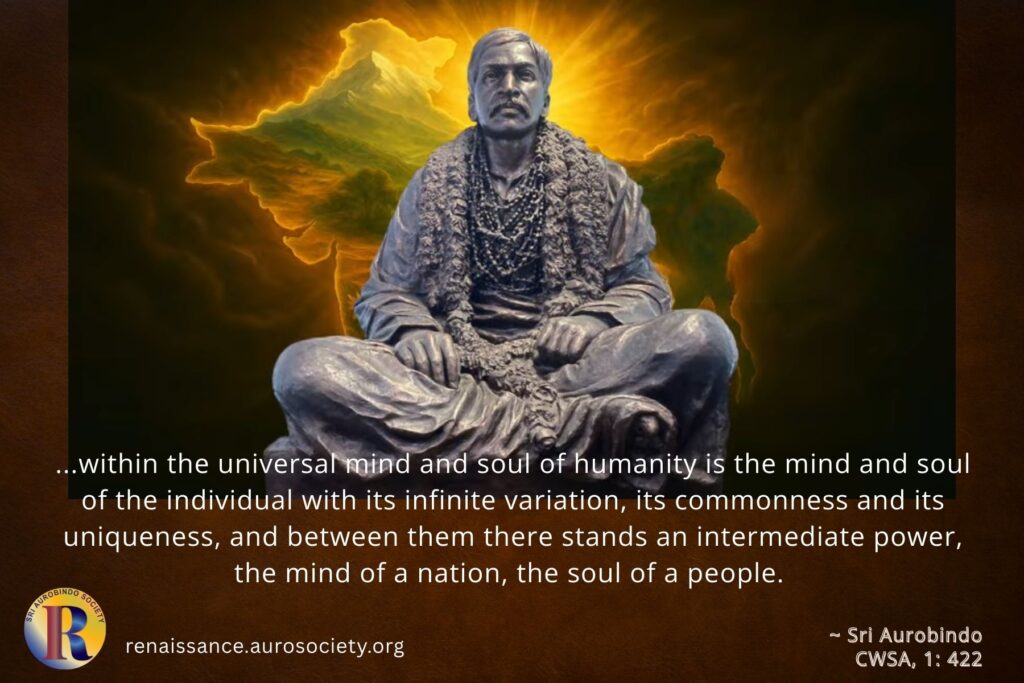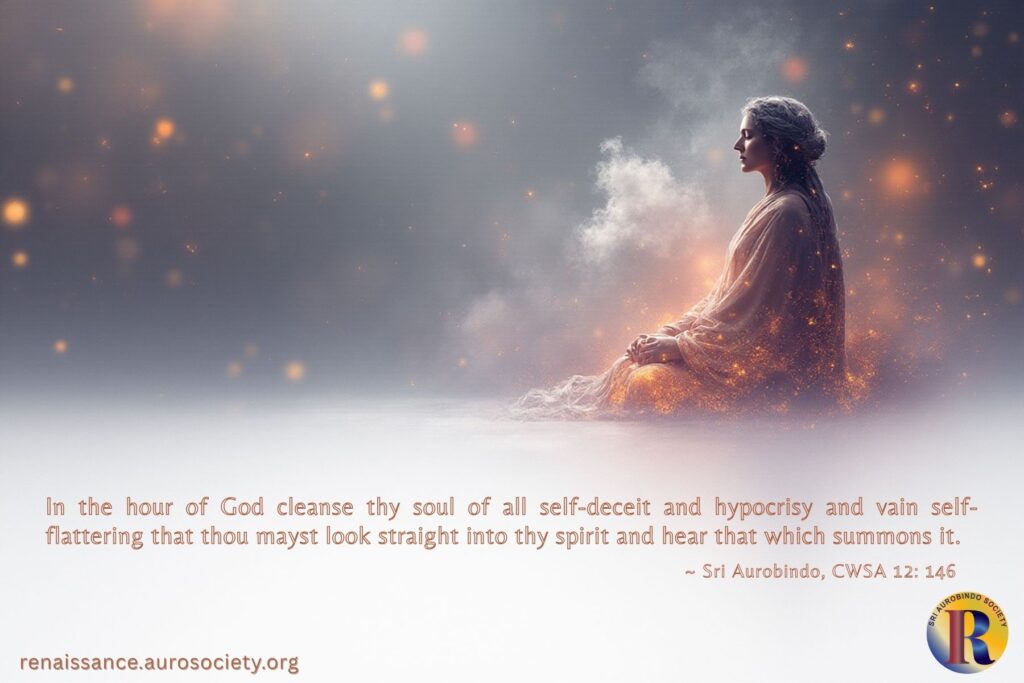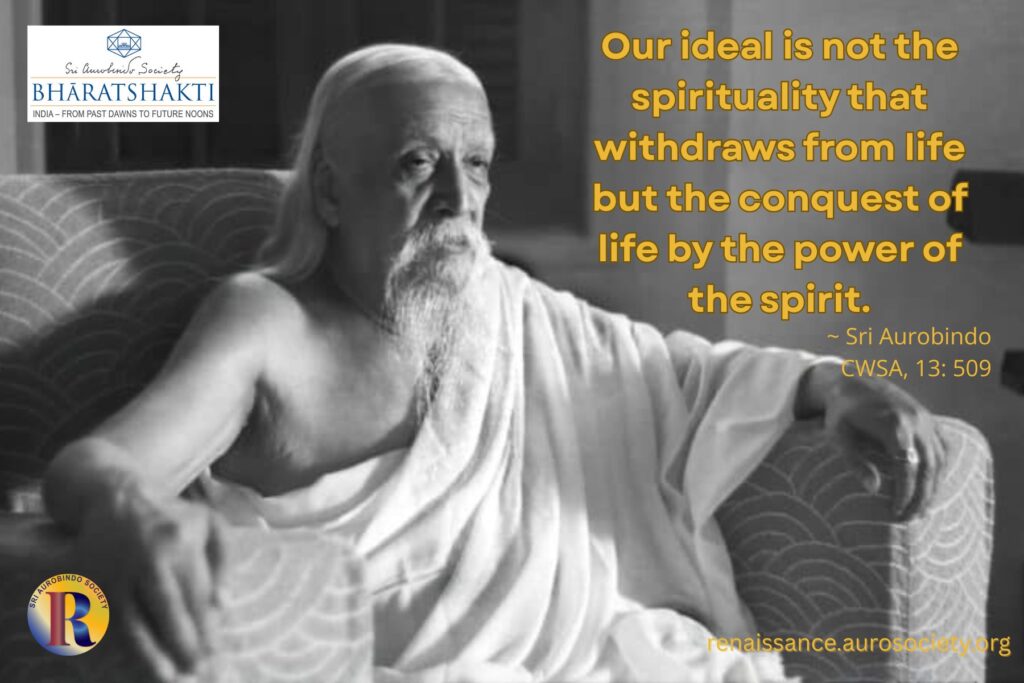Sri Aurobindo once said that his life was not lived on the surface for men to see. As I understand this statement, it means only with an inner vision — a vision one may be blessed with through intense yogic sadhana and with Divine Grace, — one could begin to understand a little the true significance of his birth, life and work. The Mother called Sri Aurobindo’s birth an “Eternal Birth.”
Words fail when we try to speak of the immense and eternal significance of the life and work of Sri Aurobindo. But something in me wants to try because every attempt becomes one more opportunity for the aspiring soul to meditate on the Timeless and Eternal Presence that Sri Aurobindo is and will be for times to come.
Heart feels a deep ananda as it begins to revel in love for Him. Mind too gets its fulfilment as it begins to surrender its intellectual arrogance and limitation. Such is the Power and Force of Sri Aurobindo, and such is the working of his Integral Yoga that everything when done with a right attitude can bring the soul a step closer to Him.
A modern Rishi, a Mahayogi, a sage-philosopher, a seer-poet, a political revolutionary, a visionary intellectual — all these words never suffice. He has been spoken of as an explorer and adventurer in consciousness. And an avatār. Avatar of the future, the Mother reminds.

“The Secret Truth”
In his closing arguments at the court, the great nationalist Deshbandhu Chittranjan Das who defended Sri Aurobindo at the famous Alipore Bomb Trial used three phrases to perfectly describe his friend – “prophet of nationalism, poet of patriotism and lover of humanity.” For Das, Sri Aurobindo stood before the bar of History for his cause, and not merely before a British Court of Justice.
Nolini Kanta Gupta writes that this description given by C. R. Das can be completed only when we add another epithet — the Builder of the Life Divine. Indeed, for Sri Aurobindo not only showed the humanity that a new world, a new future, a divine life is possible on the earth; but with his Divine Collaborator, the Mother, brought down that supramental consciousness which will transform the earthly life to a divine life.
This was “the secret Truth that worked in him from behind and gave to all his earlier preoccupations the reality and the beauty they attained and the fullness of their significance. He worked for human evolution, that was his life mission.” (Nolini Kanta Gupta, The Yoga of Sri Aurobindo – Part Eleven, Sri Aurobindo Ashram Press, 1971, pp. 75-82).
The Most Dangerous Man
The Mahayogi of Pondicherry was the yogi-revolutionary leading India’s freedom struggle – the one whom the mighty British empire called “the most dangerous man.”
He was dangerous not only because the force of his pen could ignite the fire of freedom in many hearts. It was also not because Aurobindo Ghose, as he was known at the time, was able to bring together various revolutionary groups from different parts of the country, breathing life and fire and a deeper focus and energy into the movement.
There was something more. That something was his yogic strength and the absolute purity, sincerity and selflessness of his intention, which made his revolutionary work highly forceful. He saw and wrote of India as a Mother, a Shakti, a power and a godhead to be worshipped. He spoke of nationalism as a religion. And people resonated with this truth. This is why he was “the most dangerous man” the British ever had to contend with.
Nationalism is a religion that has come from God; Nationalism is a creed in which you shall have to live. Let no man dare to call himself a Nationalist if he does so merely with a sort of intellectual pride, thinking that he is more patriotic, thinking that he is something higher than those who do not call themselves by that name.
If you are going to be a Nationalist, if you are going to assent to this religion of Nationalism, you must do it in the religious spirit. You must remember that you are the instrument of God for the salvation of your own country. You must live as the instruments of God.
~ CWSA, Vol. 7, pp. 818-819
Yoga for the Nation
Sri Aurobindo had deep and vast understanding of the true Indian temperament and innate nature.
But it was not only his deep self-immersion into the founts of Indian culture at Baroda that gave him this keen perception. By the time he came to the forefront of the revolutionary movement, Sri Aurobindo had already had several transformative spiritual experiences and realisations.
It began right from the time of his landing at Apollo Bunder in 1893. Then we know of his experience at the Shankaracharya Hill in Kashmir and his vision of the Goddess at an old Kali temple in Chandod — just to name a few.
Sri Aurobindo started his practice of Yoga in 1904 in Baroda on his own account after learning Pranayama from a friend. His yoga, he always said, was for the nation’s freedom. He had perfectly realised that the soul of India exists in her spirituality and yoga.
Throughout India’s long history, whenever she needed an awakening, it was her yogis and rishis who showed her the Light she needed. Sri Aurobindo, the yogi-revolutionary was now waking up a sleeping India. And it was natural that the British empire would consider him the most dangerous!
Sri Aurobindo was the first leader to openly put forward the idea of complete independence, Purna Swaraj, for India.
He was also the first to advocate an economic, national, educational, judicial and administrative boycott as a tactic to fight the imperialists. He laid down clear and specific guidelines for setting up Swadeshi, a national education system, a system of national arbitration courts, and a national organisation for self-government. His vision was a rare combination of remarkable idealism and practical programme of action. Prosecuted twice for sedition and once for conspiracy, he was released each time for lack of evidence.
But politics was never the end-goal of Sri Aurobindo’s revolutionary work. India’s freedom was seen by Sri Aurobindo in the larger context of the destiny of the human race. In fact, many of his political writings anticipate his Integral philosophy. He was convinced that “the next state in the human progress is not a material but spiritual, moral and psychical advance. . .” (CWSA, Vol. 6, p. 572). As he wrote:
India must have Swaraj in order to live for the world, not as a slave for the material and political benefit of a single purse-proud and selfish nation, but a free people for the spiritual and intellectual benefit of the human race.
(CWSA, Vol. 6, p. 573)
In January 1908, Sri Aurobindo met a Maharashtrian Yogi, Vishnu Bhaskar Lele, who instructed him how to reach complete silence of the mind and immobility of the whole consciousness. Sri Aurobindo was able to achieve this in 3 days, and he later said that that Silence never left him since then. All his political work and writing was done with this Silent Mind. This experience of Silent Brahman was one of the many lasting and massive spiritual realisations that would come to him later.
In a letter to his wife, Mrinalini Devi, dated 30 August 1905, Sri Aurobindo for the first time spoke of his deep yogic aspiration – his inner quest to realise the divinity within, his intense yearning to see India free and strong, and his profound passion to offer everything at the service of the Divine. He called these as his three madnesses – we may see them as true markings of the yogi-revolutionary that he was.
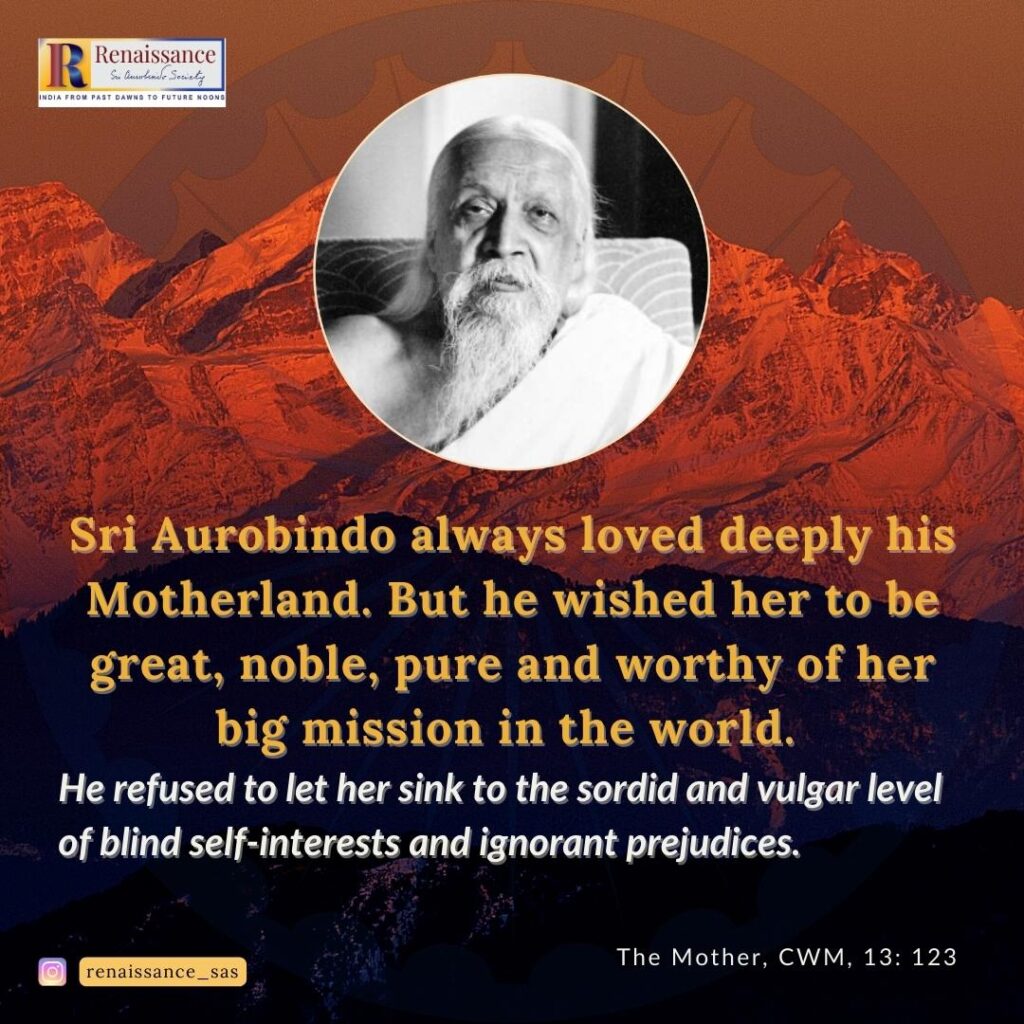
Spiritual Nationalism
His was not a mere patriotic love, it was truly a worship of India. His patriotism was not of a narrow partisan variety that makes one attached to one’s country and regard it as the greatest and best. He adored India, because he knew that India was destined to be the custodian of the supreme knowledge, and the leader of the world in the ways of the Spirit.
Sri Aurobindo’s concern was for the whole humanity, whole earth. His inner yogic vision, his rishi-drishti knew of India’s true role in the evolutionary march of humanity. That vision guided his work for India’s freedom. We see it expressed in the ideals of which he spoke in his speeches and he wrote in his articles in Bande Mataram and Karmayogin. They expressed the wide and all-embracing spirit of his spiritual nationalism.
Our ideal of Swaraj involves no hatred of any other nation nor of the administration which is now established by law in this country. . .
Our ideal of patriotism proceeds on the basis of love and brotherhood and it looks beyond the unity of the nation and envisages the ultimate unity of mankind. But it is a unity of brothers, equals and freemen that we seek, not the unity of master and serf, of devourer and devoured.
~ CWSA, Vol. 8, pp. 152-153
And then came the famous Alipore Bomb case and his arrest in May 1908.
Jail, which would have been the most horrific experience for an ordinary person became a spiritual retreat for the yogi Sri Aurobindo. Speaking of his imprisonment as a year-long living in an ashram, he wrote in Tales of Prison Life: “The only result of the wrath of the British Govt. was that I found God.”
After his acquittal, in the famous Uttarpara speech, he spoke about the spiritual realisation of Vasudeva Sarvam Iti that he had in the prison.
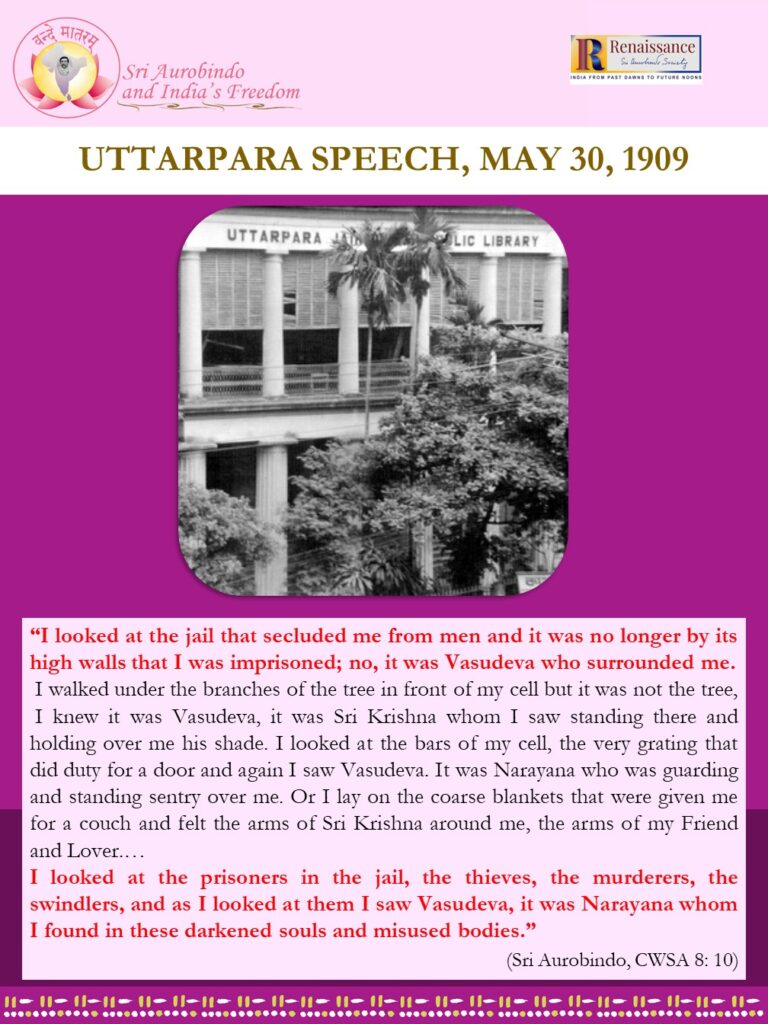
To Pondicherry
It was God who was leading India’s fight for freedom, Sri Aurobindo often said. Just as all his political activity was God-directed, so was his decision to leave politics. In 1910 he left for Pondicherry on an inner ‘ādesh’ to devote himself entirely to inner spiritual work.
In 1914, with the Mother’s first coming, came the publication of a philosophical monthly, the Arya. It was in the pages of Arya that most of his important works, The Life Divine, The Synthesis of Yoga, Essays on the Gita, The Isha Upanishad were first serialised.
In addition to these works which embodied the inner knowledge realised in his Yogic practice, Sri Aurobindo also wrote several essays concerned with the spirit and significance of Indian civilisation and culture (The Foundations of Indian Culture – later published as The Renaissance in India and Other Essays on Indian Culture), the true meaning of the Vedas (The Secret of the Veda), the progress of human society (The Human Cycle), the nature and evolution of poetry (The Future Poetry) and the possibility of the unification of the human race (The Ideal of Human Unity). His collected poetic works include poems written in England, Baroda and Pondicherry.
Savitri, his epic mantric poem, the longest poem in English language (24,000 lines), was used by Sri Aurobindo, in his own words, “as a means of ascension” of consciousness. The Mother has spoken of Savitri as a mantra of transformation.
In Sri Aurobindo’s writings we find everything raised to its highest level of consciousness and nothing left out. He helps us see even the seemingly mundane from the point of view of the deepest view of reality and existence and the widest range of possibilities and potentialities. Reading Sri Aurobindo in itself becomes a transformative experience, a sadhana.
A God’s Labour
But behind all this outer work of writing and keeping up with mounts of correspondence from disciples and devotees, sitting in his small room, Sri Aurobindo was silently engaged in his most important work. That work, that God’s Labour was to bring down a new supramental consciousness on earth. It is this which will change the very nature and processes of human evolution and transformation, and open the door to a glorious new creation, a new world.
I have delved through the dumb Earth’s dreadful heart
And heard her black mass’ bell.
I have seen the source whence her agonies part
And the inner reason of hell.Above me the dragon murmurs moan
And the goblin voices flit;
I have pierced the Void where Thought was born,
I have walked in the bottomless pit.On a desperate stair my feet have trod
Armoured with boundless peace,
Bringing the fires of the splendour of God
Into the human abyss.He who I am was with me still;
~ Sri Aurobindo, A God’s Labour, Collected Poems, CWSA, Vol. 2, p. 537
All veils are breaking now.
I have heard His voice and borne His will
On my vast untroubled brow.
Read:
Towards a New World – Work of the Dual Avatāra
With the Mother’s final coming to Pondicherry in 1920, a new chapter began in Sri Aurobindo’s yoga. The Lord and his Shakti were now collaborating to bring down the Supramental consciousness. After the siddhi of November 1926, Sri Aurobindo embarked on yet another Labour Divine.
Sri Aurobindo’s Integral Yoga concerns itself with all life and aims at complete change of consciousness to transform the life to its truer essence.
The aim is not merely to connect the lower with the higher but rather transforming the lower existence to its higher essential truth through a descent of the higher consciousness and force.
“It is only by a change of consciousness that the true basis of life can be discovered,” Sri Aurobindo had said once (CWSA, 35: 194). This change of consciousness, at the cosmic level, is about the change from Mind to Supermind as the founding principle of all creation, all manifestation.
On the evening of 29 February 1956, during a collective meditation with the Mother in the Ashram playground, a stupendous event happened which opened the gateway for the next future of the earth-consciousness. The manifestation of the Supramental in the earth consciousness was achieved.

Watch:
The Mother and New Consciousness
Sri Aurobindo has taught humanity that the age of an ascetic yogi in a cave far away from the maddening crowd of life, so to speak, must give way to an age of yoga in real-life, in real-time which aims at the transformation of one’s entire being, the life and the world.
He has ushered in a new age of universal spirituality, where man aspires for a greater widening, deepening and heightening of consciousness, and seeks spiritual experience in its original purity above and beyond all religions. He teaches us to strive towards a global Truth and enter into direct relation with the Divine.
This will be the true basis of a new world, a new creation founded on the supramental Truth consciousness. And therein lies the true future of humanity and the world, the progressive march toward a Divine Life.
A Special Issue for August 2022
It is a perfect opportunity — this Hour of God — 15 August 2022 — the date that marks the 150th birthday of Sri Aurobindo, and by no coincidence, 75 years of India’s political independence, to sing glories of the Eternal Presence that Sri Aurobindo was, is and will be. We begin this special issue of Renaissance with our Guiding Light feature which includes the Words of Sri Aurobindo on Himself, and Words of the Mother on Sri Aurobindo. A message of Sri Aurobindo given on 15 August 1926 tells us of the inner significance of August 15 for yoga.
We then bring for our readers a bouquet of flowers, each with a fragrance unique and beautiful. Beginning from Amal Kiran’s ‘The Series of Avatars and Avatar of the Future‘ and moving to Nolini Kanta Gupta’s ‘The Greatness of the Great‘, from Rishabhchand’s ‘Sri Aurobindo, the Reconciler of Light and Life‘ (presented in 2 parts) to A. B. Purani’s ‘Sri Aurobindo and Indian Cultural Renaissance‘ (presented in 4 parts), our readers will go on discovering a variety of beautiful and harmonious notes strung together to give a glimpse of the eternal relevance of the life and work of Sri Aurobindo.
We have Ananda Reddy telling us of ‘The Timeless Relevance of Sri Aurobindo‘ and Suhas Mehra with a video submission titled ‘We bow to you, Sri Aurobindo, O Sun of the New Age, Bringer of the New Light!’. Readers will delight in Charan Singh’s piece ‘Sri Aurobindo: His Birth Unique, His Presence Ubiquitous‘ and also Janani Ramanathan’s ‘Understanding Sri Aurobindo and the Character of Life through Literature.’ Another enjoyable reading is the article ‘Sri Aurobindo’s Work for India’s Political Liberation‘ by Vijay Poddar of Sri Aurobindo Society, written when he was a student at Sri Aurobindo International Center of Education.
See our Digital Exhibit:
Sri Aurobindo, the Eternal Presence
In the Book of the Month feature, we highlight free e-books on ‘India and her Mission‘ published recently by Sri Aurobindo Society. These e-books are compilations of the words of Sri Aurobindo and the Mother on various topics related to India. Compiled by Jamshed M. Mavalwalla, these books are available HERE.
We continue with the second part of our ongoing series – ‘Sri Aurobindo’s Interpretation of Indian Culture: The Epics‘ by Prema Nandkumar. After last month’s break, we bring again our regular feature — Insightful Conversations, this time in Hindi, featuring a conversation with an acclaimed performer of Powada, a unique poetic storytelling art-form from Maharashtra.
As always, we offer this work at the lotus feet of Sri Aurobindo and the Mother.
In gratitude,
Beloo Mehra (for Renaissance Editorial Team)

~ Design: Beloo Mehra and Biswajita Mohapatra

